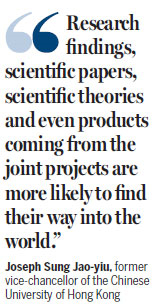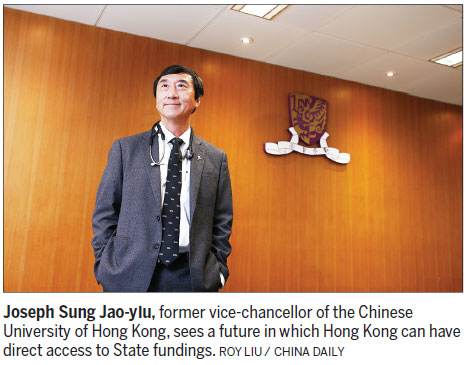Ex-CUHK head says HK has solid international exposure, while mainland researchers have access to a much larger pool
Greater cooperation in science and technology between Hong Kong and the mainland will maximize the strengths of both sides, Joseph Sung Jao-yiu, a leading biomedical scientist in the city, told Hong Kong media.
Sung welcomed President Xi Jinping's instruction, announced on Monday, to enhance sci-tech collaboration between the mainland and Hong Kong, and support the SAR in becoming an international center for innovative technologies.

A researcher in the State Key Laboratory of Digestive Disease at the Chinese University of Hong Kong. The lab, established in partnership with the Fourth Military Medical University in Shaanxi province, is an epitome of cross-boundary research collaboration. Roy Liu / China Daily
"President Xi's instruction opens a door to Hong Kong scientists and researchers," said Sung, former vice-chancellor of the Chinese University of Hong Kong.
"It gives our research jobs flexibility. Easy transportation between Hong Kong and Guangdong province facilitates exchanges between Hong Kong and mainland researchers."
"In future, Hong Kong research teams could apply for State funding directly without having to team up with mainland researchers," he added.
Hong Kong has a plenty of advantages in scientific research and development in a number of disciplines.
Despite the solid advantage, Hong Kong researchers struggle to access generous funding and other forms of financial support to sustain their projects.
"Although some obtain research funding from the local government, the sum could be far from enough to carry out costly projects. As a result, we can only produce research papers or sell our patents," Sung said.
"This is not the case on the mainland. Mainland institutes and enterprises have big R&D budgets, which we cannot compare with," added Sung.
Hong Kong scientists and researchers now can secure national funding and support as long as the scientific projects have both Hong Kong and mainland scientists involved.
Sung and his research team are among the first batch of beneficiaries, granted 990,000 yuan ($155,828) at the end of last year for ongoing research on digestive cancers.
Sung is hailed as an "Asian hero" for his accomplishments in combating the severe acute respiratory syndrome (SARS) outbreak which struck the city in 2003.
Together, stronger
He believes that cross-boundary collaboration will allow both sides to maximize their strengths and complement their disadvantages. "Research findings, scientific papers, scientific theories and even products coming from the joint projects are more likely to find their way into the world."

Hong Kong had started much earlier than the mainland in terms of collaborating with international research organizations, particularly on subjects like biomedicine, Sung said. "Therefore, local scientists are familiar with the standards and clinical designs involved in research and clinical tests."
That's why research achievements made in Hong Kong are more likely to be recognized by overseas industries. "If a certain medicine is developed phase by phase in Hong Kong (with Hong Kong researchers engaged), the chance of obtaining international recognition and being introduced to the international markets would increase," added Sung.
However, Hong Kong researchers can hardly rival their mainland counterparts when it comes to the number of medical cases seen and patients dealt with. Mainland researchers have richer clinical experience.
"With only 7 million people in our city, it's no surprise that our doctors encounter fewer cases for each type of disease, even fewer than the doctors in such major cities as Guangzhou and Shanghai do," noted Sung.
Job opportunities are a major concern among many local graduates who aspire to take up research positions. Research-related posts are elusive in Hong Kong, except at universities, Sung said, while R&D jobs are easily available in mainland companies and organizations.
Hong Kong could suffer a brain drain if local graduates seek employment on the mainland. This is not a big issue to Sung, who said "any scientific discovery has a global impact, regardless of where the talents work and live".
But Sung said the Hong Kong SAR Government needed to put more effort into improving employability in R&D. After all, only promising career prospects can attract and retain talents.
Hong Kong's youths should adopt a far broader vision when it comes to job planning, he suggested. "R&D jobs can't be completed in one or two years. It needs patience. The government's support for youths should be sustainable. It's not a matter of half-year or one-year support. Cultivating a tree is not that fast," Sung added.


















